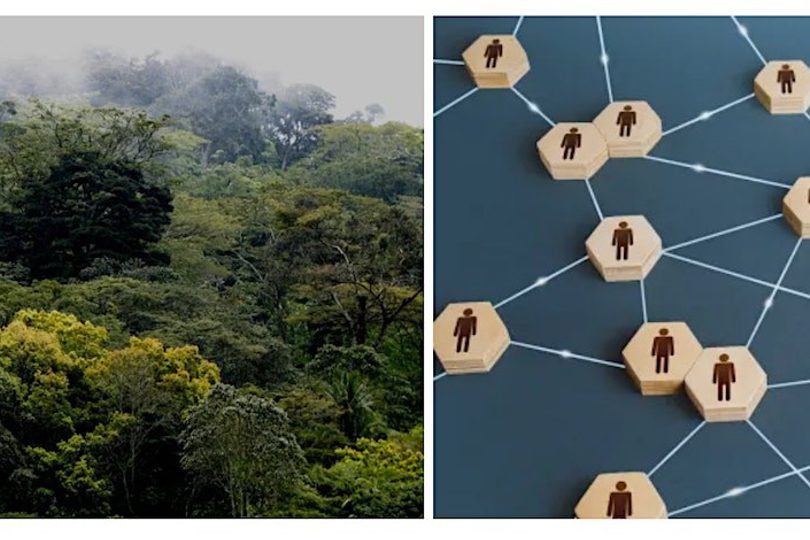
The Oxford Martin Programme on Pandemic Genomics will host two talks from Prof. Petri Pellikka and Dr. Mika Siljander of the University of Helsinki, followed by a film screening.
'Environmental sensing of impact of land cover changes to climate and ecosystem services in Afromontane landscape in Kenya' with Prof Petri Pellikka (approx 20 mins)
University of Helsinki has been carrying 20 years research on land cover and land use changes applying remote and environmental sensing in Taita Hills, which is a mountainous area rising from savannah grasslands to montane rainforests over 2000 m of elevation. Conversion of forests and other woody vegetation to agricultural land, livestock management and conservation areas has led changes in the ability of the forests and other woody vegetation to provide ecosystem services. The ability to capture and store water, provide habitats for endangered and endemic fauna and flora, host biodiversity, and sequester CO2 from air and store it as above ground biomass has decreased over the decades. In addition, the anthropogenic land cover, such as croplands and grazing areas, seem to be strong sources for CO2 emissions from the soils compared to bushlands with woody land cover. Loss of forests also lead to increased land surface temperature and decreased evapotranspiration, thus changing the local climate with consequences to climate in general. Land cover change and warming of climate in mountainous area also change the habitats of insects, which carry viruses such as malaria. At the same time, fast growing human population in sub-Saharan Africa needs more food production, but in the end, the impacts of land cover change may have fatal consequences to food security. These sustainability challenges are studied at Taita Research Station of University of Helsinki established in the Taita Taveta County.
'COVID-19 (SARS-CoV-2) sociodemographic, socioeconomic, and spatiotemporal trends and patterns in Helsinki and Finland' with Dr Mika Siljander (approx 20 mins)
The COVID-19 pandemic has affected countries worldwide, including Finland. An overview of COVID-19 crises in Finland will be presented, as well as a spatiotemporal case study revealing sociodemographic, socioeconomic, and spatiotemporal COVID-19 trends in the City of Helsinki. COVID-19 cases were found to be clustered in the study, with high relative risk areas emerging primarily in socioeconomically vulnerable neighborhoods. The variation in COVID-19 infection rates was largely explained by median income and the proportion of foreign citizens in the population. The main limitations discovered in the spatial analysis of COVID-19 epidemics study were data quality and access to fine-scale up-to-date data. These are critical for better preparing for future pandemic waves and guiding policymakers and local health authorities in implementing mitigation strategies.
Film screening: 'Water's Journey'
A documentary film telling of the consequences to water resources, environment and livelihoods after forests are lost due to agricultural expansion (50 mins).
REGISTRATION
- To register to attend these talks click here.
This event is organised by the Oxford Martin Programme on Pandemic Genomics.

Professor Petri Pellikka
Professor of Geoinformatics, University of Helsinki
Prof Pellikka is Professor of Geoinformatics with primary focus on remote sensing applications on land cover and impact of human-nature interactions on the environment. His research group applies mostly optical remote sensing data including hyperspectral data and laser scanner data. During the last decade the focus has been in Africa, and particularly land cover and land use change caused by agricultural expansion and conservation, and its impact on water resources, biodiversity, climate and livelihoods. Earlier I have been involved in remote sensing research of glaciers as indicators of climate change and developing remote sensing systems and correction procedures for radiometry and geometry of the data.
He is also a director of multidisciplinary Taita Research Station of the University of Helsinki in Kenya, which provides research questions and solutions from sustainability science to Earth system science for students and staff of the university and others.

Dr Mika Siljander
Researcher, University of Helsinki
Siljander is a grant-funded researcher at Helsinki Lab of Interdisciplinary Conservation Science (HELICS) at the Department of Geosciences and Geography, University of Helsinki. He is an expert in GIS modeling and spatial statistics. He has worked on research and development projects funded by the Academy of Finland and the Ministry of Foreign Affairs of Finland, such as TAITATOO, TAITAWATER, AFERIA, and CHIESA. His primary research interests include forest fires, species distribution, nature conversation, land cover change, and modeling of search and rescue services. He has over 20 years of experience teaching GIS and remote sensing, and he coordinated the 2017-2020 TAITAGIS project in collaboration with Taita Taveta University in Kenya. His most recent collaboration with the ECHOLAB research group - VECLIMIT project, was on vector-borne diseases (VBD) and COVID-19. The primary goal of the VECLIMIT project was to estimate and predict VBD risks associated with climate change in Finland.
Keep in touch
If you found this page useful, sign up to our monthly digest of the latest news and events
Subscribe